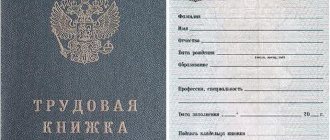Download in word a sample employment contract with a courier 2018
EMPLOYMENT CONTRACT
with the courier
_______________ "___"________ ____
___________________________________________________________ (name of the employer), hereinafter referred to as___ "Employer", represented by _________________________________ (position, full name), acting___ on the basis of ________________________________________ (document confirming authority), on the one hand, and ____________________________ (full name . employee), hereinafter referred to as "Employee", on the other hand, collectively referred to as the "Parties", have entered into this agreement as follows:
1. THE SUBJECT OF THE AGREEMENT
1.1. The Employer undertakes to provide the Employee with work as a courier, to provide working conditions provided for by labor legislation and other regulatory legal acts containing labor law norms, a collective agreement (if any), agreements, local regulations and this agreement, to pay on time and in full The Employee receives a salary, and the Employee undertakes to personally perform the functions of a courier, according to the internal labor regulations in force at the Employer.
1.2. Work under a contract is the main one for the Employee.
(Option 1.2. Work under this employment contract is a part-time job for the Employee.)
1.3. The Employee's place of work is __________________________ <1>.
1.4. The employee reports directly to ________________.
1.5. The employee is subject to the following working conditions at the workplace:
— ___________________________________________ <2>.
(specify class, subclass of working conditions)
1.6. The Employee’s labor duties are not related to performing heavy work, work in areas with special climatic conditions, work with harmful, dangerous and other special working conditions.
1.7. Working conditions in the workplace comply with the requirements of the current legislation of the Russian Federation in the field of labor protection, taking into account the specifics of the Employee’s labor functions.
1.8. The employee is assigned a traveling nature of work <3>.
In this case, the Employer reimburses the Employee for expenses related to the performance of work duties, including travel expenses and other expenses incurred by the Employee with the permission or knowledge of the Employer.
1.9. The Employee undertakes not to disclose secrets protected by law (state, official, commercial, other) and confidential information owned by the Employer and its counterparties.
2. DURATION OF THE AGREEMENT
2.1. The Agreement comes into force on the date of its conclusion by the Employee and the Employer (or from the day the Employee is actually admitted to work with the knowledge or on behalf of the Employer or his representative).
2.2. Start date: "__"__________ ____
2.3. The contract is concluded for an indefinite period.
(Option 2.3. The contract was concluded for a period of ____________ in connection with _________________________ (circumstances (reasons) that led to the conclusion of a fixed-term contract) <4>.)
(Option 2.4. In order to verify the compliance of the Employee’s qualifications with the position held, his attitude to the work assigned to him, a probationary period of ____ (_____) months <5> is established from the date of commencement of work.
If during the probationary period the Employee comes to the conclusion that the work offered to him is not suitable for him, then he has the right to terminate this employment contract at his own request by notifying the Employer in writing three days in advance.)
3. CONDITIONS OF PAYMENT FOR THE EMPLOYEE
3.1. For the performance of labor duties, the Employee is set an official salary in the amount of _______ (____________) rubles per month.
(Option for part-time work:
3.1. The Employee's remuneration is made ___________________________ (in proportion to the time worked/depending on output/on other conditions). When setting standard assignments for persons working part-time with time-based wages, wages are paid based on the final results for the amount of work actually completed.)
3.2. The employer sets additional payments, allowances and incentive payments. The amounts and conditions of such additional payments, allowances and incentive payments are determined in the Regulations on Bonuses for the Employee (approved by the Employer “___”________ ____), which the Employee was familiarized with when signing the contract.
3.3. The employee is paid an additional payment in the amount of _______ (____________)
rubles for ___________________________________________________.
(results that are the reason for additional payment)
3.4. Overtime work is paid for the first two hours of work at time and a half, for subsequent hours - at double rate. At the Employee's request, overtime work, instead of increased pay, may be compensated by providing additional rest time, but not less than the time worked overtime.
3.5. Work on a day off or a non-working holiday is paid in the amount of a single part of the official salary per day or hour of work in excess of the official salary, if work on a day off or a non-working holiday was carried out within the monthly standard working time, and in the amount of a double part of the official salary per day or hour work in excess of the official salary, if the work was performed in excess of the monthly working hours. At the request of an Employee who worked on a day off or a non-working holiday, he may be given another day of rest. In this case, work on a weekend or a non-working holiday is paid in a single amount, and a day of rest is not subject to payment.
3.6. Downtime caused by the Employer is paid in the amount of two-thirds of the Employee’s average salary.
Downtime due to reasons beyond the control of the Employer and Employee is paid in the amount of two-thirds of the official salary, calculated in proportion to downtime.
Downtime caused by the Employee is not paid.
3.7. The Employee's wages are paid by issuing cash at the Employer's cash desk (by transferring to the Employee's bank account) every half month on the day established by the internal labor regulations.
3.8. Deductions may be made from the Employee's salary in cases provided for by the legislation of the Russian Federation.
4. REGIME OF WORKING TIME AND REST TIME. VACATION <6>
4.1. The employee is given the following working hours: _____________________ with the provision of ______ day(s) off ______________.
4.2. Start time: _________________________________.
Closing time: ___________________________.
(Working hours when working part-time should not exceed four hours a day.)
4.3. During the working day, the Employee is given a break for rest and food from ____ hour to ____ hour, which is not included in working hours.
4.4. Annual basic paid leave is granted to the Employee for a duration of ____ (at least 28) calendar days.
The right to use vacation for the first year of work arises for the Employee after six months of his continuous work with this Employer. By agreement of the parties, paid leave may be provided to the Employee before the expiration of six months.
Leave for the second and subsequent years of work may be granted at any time of the working year in accordance with the order of provision of annual paid leave established by the given Employer.
The Employee must be notified by signature of the start time of the vacation no later than two weeks before its start.
4.5. For family reasons and other valid reasons, the Employee, based on his written application, may be granted leave without pay for the duration established by the labor legislation of the Russian Federation and the internal labor regulations of the Employer.
5. RIGHTS AND OBLIGATIONS OF AN EMPLOYEE
5.1. Job responsibilities of the Employee:
5.1.1. Delivers business papers, packages, letters, books, etc. by appointment and instructions of a superior employee, and also receives and delivers them from other organizations.
5.1.2. Records sent and received business papers in the mailing book.
5.1.3. Calls the employee to the heads of the service or department.
5.2. The employee is obliged:
5.2.1. Comply with internal labor regulations, labor discipline, labor protection and labor safety requirements, and the provisions of other local regulations.
5.2.2. Treat with care the property of the Employer (including the property of third parties held by the Employer, if the Employer is responsible for the safety of this property) and other employees.
5.2.3. Immediately notify the Employer of the occurrence of a situation that poses a threat to the life and health of people, the safety of the Employer’s property (including the property of third parties held by the Employer, if the Employer is responsible for the safety of this property).
5.2.4. By order of the Employer, go on business trips in Russia and abroad.
5.3. The employee has the right to:
— amendment and termination of the contract in the manner and under the conditions established by the Labor Code of the Russian Federation and other federal laws;
- providing him with work stipulated by the contract;
— a workplace that meets state regulatory requirements for labor protection and the conditions provided for by the collective agreement (if any);
— timely and full payment of wages in accordance with their qualifications, complexity of work, quantity and quality of work performed;
— rest provided by the establishment of normal working hours, reduced working hours for certain professions and categories of workers, the provision of weekly days off, non-working holidays, paid annual leave;
— professional training, retraining and advanced training in the manner established by the Labor Code of the Russian Federation and other federal laws;
— protection of one’s labor rights, freedoms and legitimate interests by all means not prohibited by law;
— compensation for harm caused to him in connection with the performance of his job duties, and compensation for moral damage in the manner established by the Labor Code of the Russian Federation and other federal laws;
— compulsory social insurance in cases provided for by federal laws.
6. RIGHTS AND OBLIGATIONS OF AN EMPLOYER
6.1. The employer has the right:
— change and terminate the contract with the Employee in the manner and under the conditions established by the Labor Code of the Russian Federation and other federal laws;
— encourage the Employee for conscientious, effective work;
— require the Employee to fulfill his job duties and take care of the property of the Employer (including the property of third parties owned by the Employer, if the Employer is responsible for the safety of this property) and other employees, and compliance with internal labor regulations;
— bring the Employee to disciplinary and financial liability in the manner established by the Labor Code of the Russian Federation and other federal laws;
— carry out certification of the Employee in accordance with the Certification Regulations in order to identify the real level of professional competence of the Employee;
— conduct an assessment of the Employee’s performance in accordance with the Regulations on Labor Performance Assessment;
— with the consent of the Employee, involve him in the performance of certain tasks that are not part of the Employee’s job responsibilities;
— with the consent of the Employee, involve him in performing additional work in a different or the same profession (position) for additional pay;
— adopt local regulations.
6.2. The employer is obliged:
— comply with labor legislation and other regulatory legal acts containing labor law norms, local regulations, and the terms of the collective agreement (if any);
— provide the Employee with work stipulated by the contract;
— ensure safety and working conditions that comply with state regulatory requirements for labor protection;
— provide the Employee with equipment, tools, technical documentation and other means necessary to perform work duties;
— pay promptly and in full the wages due to the Employee, as well as make other payments within the time limits established in accordance with the Labor Code of the Russian Federation, the collective agreement (if any), and internal labor regulations;
— provide for the Employee’s everyday needs related to the performance of work duties;
— carry out compulsory social insurance of the Employee in the manner established by federal laws;
— compensate for harm caused to the Employee in connection with the performance of labor duties, as well as compensate for moral damage in the manner and under the conditions established by the Labor Code of the Russian Federation, other federal laws and other regulatory legal acts of the Russian Federation;
— familiarize the Employee, against signature, with the adopted local regulations directly related to his work activity;
— perform other duties provided for by labor legislation and other regulatory legal acts containing labor law norms, a collective agreement (if any), agreements, and local regulations.
7. EMPLOYEE SOCIAL INSURANCE
7.1. The employee is subject to compulsory social insurance against industrial accidents and occupational diseases in the manner and under the conditions established by the current legislation of the Russian Federation.
8. WARRANTY AND COMPENSATION
8.1. During the period of validity of this agreement, the Employee is subject to all guarantees and compensations provided for by the labor legislation of the Russian Federation, local acts of the Employer and this agreement.
9. RESPONSIBILITY OF THE PARTIES
9.1. A party to a contract guilty of violating labor legislation and other regulatory legal acts containing labor law norms is liable in cases and in the manner established by the Labor Code of the Russian Federation and other federal laws.
9.2. The financial liability of a party to a contract arises for damage caused by it to the other party to the contract as a result of its culpable unlawful behavior.
9.3. In cases provided for by law, the Employer is obliged to compensate the Employee for moral damage caused by unlawful actions and/or inaction of the Employer.
9.4. Each party is required to prove the amount of damage caused.
10. TERMINATION OF THE AGREEMENT
10.1. This agreement may be terminated on the grounds provided for by the current legislation of the Russian Federation.
10.2. The day of termination of the employment contract in all cases is the Employee’s last day of work, with the exception of cases where the Employee did not actually work, but retained his place of work (position).
10.3. The Employer has the right to decide to make a compensation payment to the Employee in the amount of ____________ in the case of _______________________.
11. FINAL PROVISIONS
11.1. The terms of the agreement are confidential and are not subject to disclosure.
11.2. The terms of the agreement are legally binding for the parties from the moment it is concluded by the parties. All changes and additions to the agreement are formalized by a bilateral written agreement.
11.3. Disputes between the parties arising during the execution of the contract are considered in the manner established by the current legislation of the Russian Federation.
11.4. In all other respects that are not provided for in the contract, the parties are guided by the legislation of the Russian Federation governing labor relations.
11.5. The agreement is drawn up in two copies having equal legal force, one of which is kept by the Employer and the other by the Employee.
11.6. Before signing the employment contract, the Employee is familiar with the following documents:
_____________________________,
_____________________________,
_____________________________.
12. DETAILS OF THE PARTIES
12.1. Employer: __________________________________________________,
address: ___________________________________________________________________,
TIN ________________________________, checkpoint ________________________________,
r/s ________________________________ in ___________________________________,
BIC ________________________________.
12.2. Worker: ______________________________________________________,
passport series _________ N ____________ issued ______________________________
____________________ “___”________ ___ city, department code _____________,
registered at the address: _____________________________________________________.
BIC _________________________________.
SIGNATURES OF THE PARTIES
Employer: Employee:
______________/______________ ______________/______________
(signature) (full name) (signature) (full name)
(M.P.)
A copy was received and signed by Employee “__”__________ ____.
Employee's signature: ____________________
———————————
Information for your information:
<1> According to paragraph. 2 hours 2 tbsp. 57 of the Labor Code of the Russian Federation, in the case where an employee is hired to work in a branch, representative office or other separate structural unit of an organization located in another area, the separate structural unit and its location are indicated.
<2> In accordance with paragraph. 9 hours 2 tbsp. 57 of the Labor Code of the Russian Federation, information about working conditions in the workplace is mandatory for inclusion in the employment contract.
According to Part 2 of Art. 3 of the Federal Law of December 28, 2013 N 426-FZ “On a special assessment of working conditions”, based on the results of a special assessment of working conditions, classes (subclasses) of working conditions in the workplace are established.
In accordance with Part 1 of Art. 14 of the Federal Law of December 28, 2013 N 426-FZ “On special assessment of working conditions”, working conditions according to the degree of harmfulness and (or) danger are divided into four classes - optimal, acceptable, harmful and dangerous working conditions.
<3> According to paragraph. 8 hours 2 tbsp. 57 of the Labor Code of the Russian Federation, the conditions determining, in necessary cases, the nature of the work (mobile, traveling, on the road, other nature of work) are mandatory for inclusion in the employment contract.
<4> A fixed-term employment contract is concluded in the cases provided for in Art. 59 of the Labor Code of the Russian Federation.
<5> A probationary period is not assigned if a fixed-term employment contract is concluded for a period of up to two months (paragraph 8, part 4, article 70 of the Labor Code of the Russian Federation) and cannot exceed three months (part 5, article 70 of the Labor Code of the Russian Federation) , and in the case of concluding an employment contract for a period of two to six months, the trial cannot exceed two weeks (Part 6 of Article 70 of the Labor Code of the Russian Federation).
<6> According to paragraph. 6 hours 2 tbsp. 57 of the Labor Code of the Russian Federation, provisions on working time and rest time are included if for a given employee the working and rest time regime differs from the general rules in force for a given employer.
<7> From 04/07/2015, business companies are not required to have a seal (Federal Law dated 04/06/2015 N 82-FZ “On amendments to certain legislative acts of the Russian Federation regarding the abolition of the mandatory seal of business companies”).
Qualification
Required Qualifications:
- Post-secondary education in an accredited program or equivalent bachelor's degree.
- At least two years of experience providing interlibrary loan, document delivery, or consortium services where valuable document delivery is involved.
- Demonstrated commitment to providing superior, company-focused service.
- Evidence of flexibility and creativity in responding to rapidly changing technologies and needs.
- Strong oral and written communication skills, organizational skills, enthusiasm for learning, and problem solving skills.
- Demonstrated experience working with colleagues.
- Demonstrated experience using technology to communicate and manage online content.
- Demonstrated commitment to diversity and understanding the contributions that a diverse workforce brings to the workplace.
We invite you to read: Fixed-term employment contract with a disabled person
Desired Qualifications:
- Three years of progressively more responsible experience providing interlibrary loan and document delivery services in an academic environment, preferably at a major university or research institute.
- Experience in using processing tools such as ILLiad, Docline, OCLC Worldcat Resource Sharing and Alma Resource Sharing.
- Experience managing people and work processes in a complex operation.
- Excellent knowledge of local, regional and national issues related to document delivery.
- Excellent knowledge of copyright, privacy, and other legal and policy issues related to document delivery.
- Experience working with regional and/or national groups.
Employment contract for traveling work
The employment contract must indicate the nature of the work - traveling, as well as prescribe compensation for it or a reference to the Regulations on the traveling nature of the work, in which it is defined. Art. speaks about this. 168.1 Labor Code of the Russian Federation. The decisive factor for determining the nature of the work is not the position, but the labor function of the employee. So, a courier driver has a traveling job, but a forklift driver who does not travel outside the enterprise does not.
Compensation for the traveling nature of work is the responsibility of the employer. It should be reflected in settlements with personnel and appear as a separate line on pay slips. So its presence can be proven. The amount of additional payments is set by the employer; as a rule, it is a monthly fixed amount. At the same time, it is not subject to taxes, which can reduce the overall tax burden of the employer (paragraph 11, paragraph 3, article 217 of the Tax Code of the Russian Federation). Therefore, if the organization has a traveling nature of work, the employee’s contract must reflect this information.
In general, the contents of the contract are standard; only clauses about the nature of the work and the procedure for additional payments for traveling work are added.
Sample employment contract for those performing traveling work
GPD with courier sample
A civil contract with an individual is concluded quite often and is an alternative to an employment contract drawn up between an employer and an employee. It can be concluded between almost any subjects who have the required legal capacity. The parties may be Russian citizens and organizations, foreign citizens and organizations. However, unlike labor law, civil law contains much fewer obligations and rights. It is easier to enter into and terminate. The main difference is the object or subject. In other words, what the conclusion of the agreement is aimed at, what is its meaning and purpose. An object is recognized as services or work that an individual undertakes to perform within a specified time frame and for a certain remuneration. It does not matter at what time the performer will be engaged in completing the assigned tasks. He does everything freely.
Responsibility
The Chief Document Delivery Courier provides general direction and management of departments, programs and department services. Hires, trains, supervises, and leads staff and students. The control of the main and regular courier during the delivery of documents includes the following functions:
- Thinks strategically about user needs consistent with the libraries' mission, vision, values, and strategic agenda.
- Establishes delivery goals, programs and projects. Develops and implements unit staffing and work flow organization to support high-performance, fast-paced operations.
- Monitors budget, prepares budget recommendations, proposes and implements budget restructuring as necessary.
- Evaluates the quality of service of resource sharing programs. Maintains accurate operational and statistical records. Prepares detailed statistical reports for reporting, service evaluation, and delivery collection management.
- Manages all activities in support of resource sharing services. Works closely with staff and libraries to ensure efficient access to regional delivery resources.
- Monitor technological developments related to all delivery services to improve innovation and service. Makes recommendations for the purchase of new equipment and software based on the needs of document delivery to other organizations.
- Works with other libraries and commercial vendors to improve access to documents.
- Participates in regional, national and international discussions on resource sharing. Maintains awareness of commercial department developments related to access to resources.
Responsibilities and tasks
Couriers work in personal and commercial settings where their job is to deliver important documents and items from one location to another. Although it is mostly full-time work, some professionals and students work as couriers part-time to supplement their income. Working for a courier company, couriers take orders over the phone or wireless data service to determine where documents need to be picked up and where it should be delivered. Depending on the purchase order, couriers may expect to receive payment. When the document is delivered, they sign them. They have to be very careful when delivering as accuracy and time efficiency is a very big part of the job.
Some couriers collect their deliveries from a central location such as a courier company; customers deliver their documents at the service counter, and couriers pick them up and deliver them to their destination. Couriers are expected to be excellent drivers, as most couriers are required to drive vehicles to make deliveries to remote buildings. A good driving record and a valid driver's license are important prerequisites when applying for this position.
Once the document is delivered, he/she must inform the office that he/she is done with delivery. For the last decade, this was typically done over the phone, but with the influx of technology, couriers are now handing over devices that can update this information on the company's website and database immediately after delivery.
Couriers are assigned assignments via telephone, two-way radio, or wireless data service. They learn where they must pick up the item and then deliver it to the designated receptacle. In some cases, they may need to ask for payment when they take it. Couriers are usually responsible for obtaining a signature when they make a delivery, so there is proof that the intended party has received the item. Some couriers work for one company and do all their external deliveries. Others are responsible for transporting documents through the company's internal mail system. Many couriers also work for courier services that make deliveries for various companies. They can also work as independent contractors and run their own businesses. Responsibilities of the courier for document delivery:
- Riding bicycles, driving vehicles, or using public transportation to reach destinations to deliver materials.
- Load vehicles with listed documents, ensuring proper loading and precautions are taken with dangerous goods.
- Unload and sort items collected along delivery routes.
- Receive messages or materials to be delivered; information about recipients, such as names, addresses, telephone numbers and delivery instructions, whether transmitted by telephone, two-way radio or in person.
- Planning and following the most efficient routes for delivering goods.
- Providing messages and items such as newspapers, documents and packages between institutional departments, other institutions and private homes.
- Sorting documents that will be delivered according to the delivery route.
- Receive signatures and payments or arrange payments to recipients.
- Introduce yourself as a business man in a suit.
- Record information such as received, as well as respond to messages to recipients.
- Consult with offices upon completion of deliveries to confirm deliveries and obtain instructions for other deliveries.
- Perform routine maintenance on delivery vehicles such as checking fluid levels and replenishing fuel.
- Make phone calls to deliver verbal messages.
- Open, sort and distribute incoming mail.
- Perform general service or clerical work such as filing materials, operating backup machines, or running errands.
- Collects, prints and stamps outgoing mail using mail counters and envelope sealers.
- Unload documents from large shipments and package them onto smaller vehicles.
- Receive jobs by telephone, wireless data service, or radio.
- Request payments.
- Obtaining signatures from clients.
- Transportation of documents.
- Production of delivery packages.
Couriers are responsible for distributing packages and documents to institutions, businesses, government agencies and individuals. They collect documents and packages from clients' offices or homes and then deliver them to their final destinations in the same area. These workers also provide important items such as passports, medical samples, airline tickets, financial documents, donated organs, legal documents, etc. They can work for different types of companies such as financial institutions, law firms, banks and medical laboratories or those with their own business.
Legal couriers collect and deliver documents and packages that are often time sensitive. The lawsuit is typically a labyrinth of deadlines, most of which have ordered the court to prevent cases of dragging over long and unreasonable periods of time. Documents and packages cannot be delivered by mail or even overnight delivery services. When time is especially important - documents must sometimes be delivered on the business day of that day. Legal couriers are required to meet deadlines. They often deliver documents that a law firm does not wish to rely on through other means of delivery, such as highly sensitive evidence or confidential case information. Legal couriers can even carry out different assignments. In some cases, they may be called upon to actually file documents in court, negotiating with a labyrinth of courts to securely, timely deliver their statements to the proper division of the court and return filed copies to the law office.










